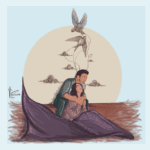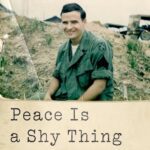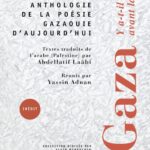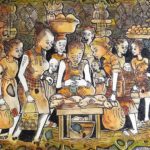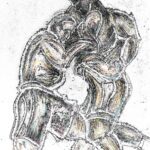At the tip of my tongue: Belarus. I was born there in 1986. I left it as many times as I returned, but since 2021 there is no coming back.
I come from an artistic family. My grandfather, orphaned at the age of three, once took his grief-filled rhymes to the acclaimed poet Yakub Kolas. “There will be no true poets in your generation, for you are the children of war,” the venerated Belarusian told him. When archives were made somewhat accessible, our family learned that it was not the Germans that killed my grandfather’s father but the Soviet state. It was easier to blame the outside enemy, and it still is.
In my early childhood, around the age of six or seven, my parents took me to the chairman of the national artist union in Minsk. I remember feeling so intimidated by his dark, wintry paintings that I did not pick up a brush for years afterward. The gray hues in which my native city endures are explained by centuries of its unfortunate history, a history so enduring that a mindset of impeccable grayness has been formed in its people, one that asks them to blend it or literally flee for your life.
In my twenties and barely out of school, I found myself in London. I was practically living in museums there, thirsty to fill the void of what I had not seen. London helped me form a new outlook: It taught me that art can be a celebration of life and creativity, a lightness to hold onto in the midst of darkness.
In 2013, wanting to belong, I returned to Belarus. The city of my childhood was starting to feel cool and fresh, Berlin-like. For the following seven years, I lived between Minsk and Athens, Greece, juggling very different fragments of life: art, poetry, overwork in the tech sector, and the demands of new motherhood.
It all came to an abrupt end in May 2021, when in the midst of a huge political crisis in Belarus, the regime landed an international plane to arrest a journalist. My American husband and I got on the last flight to Europe before the borders were shut down. When Russia attacked Ukraine, we were already in the US. The war changed everything.
※ ※
There is a poem by César Vallejo, translated by Rebecca Seiferle, that has become my polestar. “And in this frigid hour, when the earth / smells of human dust and is so sad, / I want to knock on every door / and beg forgiveness of I do not know whom, / and bake bits of fresh bread for him / here, in the oven of my heart . . . !” Since February 2022, I have produced more work, both artistic and literary, than in all the years prior.
Beautiful Prisoners is a collage made in 2020 as a response to imprisonment of the outspoken opinion leaders (writers, bloggers, poets, musicians, lawyers, IT specialists, etc.) in Belarus. Forward to 2023, it can as well be about Russia. In Belarus, the number of political prisoners is close to fifteen hundred. It’s hard to say how many of them are in Russia since the outbreak of the war. When you search for that information on Google, there are no definite numbers, but one of the first articles that emerges is “Democracy & Human Rights Abuses in Russia: No End in Sight.” Yet my artwork of the same (albeit shortened) title is not about political prisoners. It is about the war itself.
Borrowing the words of the Ukrainian poet Dmitry Blizniuk (translated by Ilya Kaminsky with Katie Farris), “the Mad teeth of a Kremlin gremlin” chewing on the lives in the land that Russia calls its mother. How is it going to end? Will the good prevail? No answers, and no end in sight.
In Soviet times, Belarus used to store the Union’s arsenal of nuclear weapons. Now Russia has announced bringing them back into our country, and President Lukashenko—who only managed to hold on to power during the 2020’s uprising due to Russia’s involvement—has no choice but to agree. Ironically, Lukashenko has roots in Ukraine, but both leaders are as red as they come. In Ukraine, there is the Kastuś Kalinoŭski Regiment consisting of Belarusian volunteers fighting on the Ukrainian side because they realize that a victory for Ukraine is a victory for us, too.
In collage, you fragment and recombine. This is what makes up my identity, and it is what I do with my art. I follow the material, torn and fragile, to a harmonious whole. Despite all the dark foresight, I hope the destruction of the war will be over soon; that the peace will break in unexpectedly, like a ray of sunshine over a bombed dome: a triumph of humanity, time to collect, rebuild and heal.
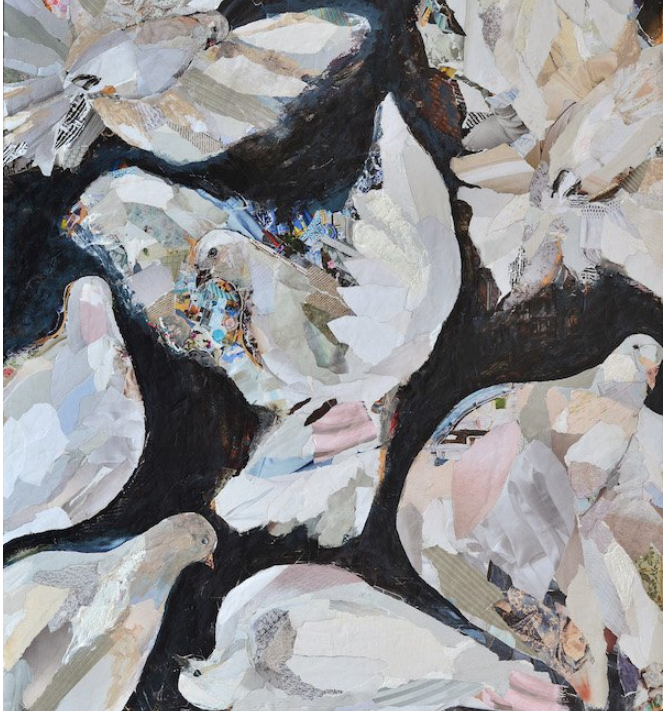 Beautiful Prisoners
Beautiful Prisoners
 No End in Sight
No End in Sight
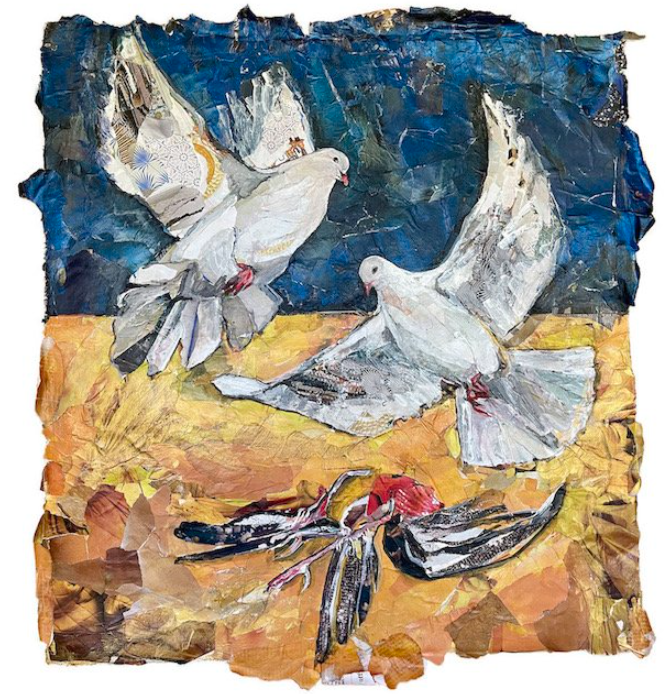
Beautiful Fighters
Lena Zycinsky
Born in Belarus in 1986, Lena is an artist and poet. As the author of numerous books and shows, Lena’s work has appeared in The New York Times and Poetry Archive, among other publications. She was recently accepted to the NYU low-residency MFA in Paris. After living in the UK as a young adult, she returned to Belarus in 2013. Following a brutal oppression of the anti-regime uprising in Belarus, she fled the country in 2021, a few months before Russia’s full-scale invasion of Ukraine. She now resides in the US.

